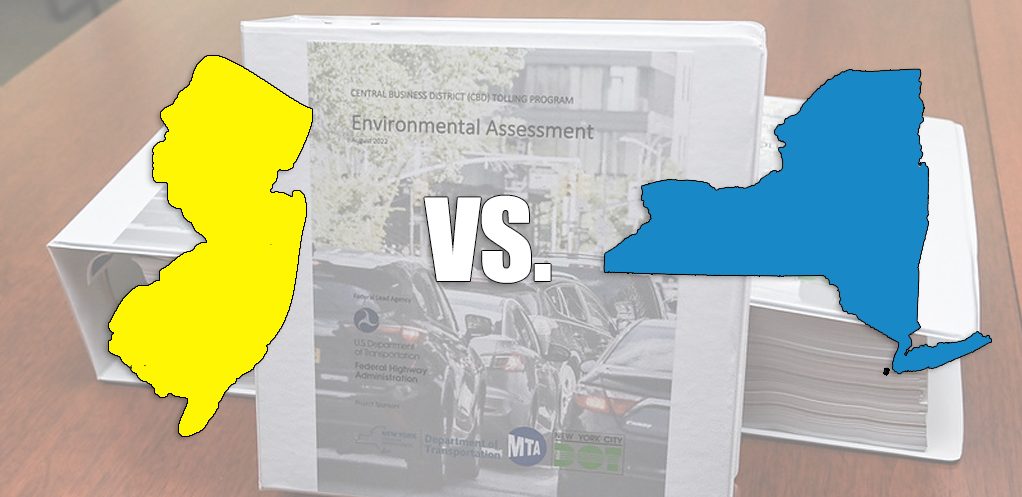Lawyers for the MTA threw their hardest legal punch late last week with a long filing that accuses New Jersey of refusing to get involved in congestion pricing's environmental review process — only to sue afterwards claiming that the Garden State's interests were ignored.
The agency's legal counsel laid out a simple thesis in a motion requesting that the court find the facts at hand are so obviously in favor of the MTA and Federal Highway Administration that New Jersey's suit against congestion pricing should not go to trial — specifically because the state declined to exercise multiple opportunities to shape the direction of the environmental assessment for congestion pricing.
"New Jersey’s claim that it was deprived of adequate opportunities to consult on the project is revisionist history," the MTA's attorneys wrote. "From early on, New Jersey agencies were encouraged to participate in the [environmental review] process. Yet not once did New Jersey (or any of its agencies) request more active involvement."
The arguments in the motion for summary judgment are similar to those that other experts made to Streetsblog when the Garden State first filed suit — namely that the FHWA and MTA properly conducted its environmental assessment.
"What New Jersey mischaracterizes as a rushed-through rubber stamp actually comprised an exhaustive, four-year long review with extensive and repeated stakeholder outreach and public engagement, and painstaking responses to comments," MTA attorneys summed up in their argument. "New Jersey faults FHWA for not studying things that were clearly studied and mischaracterizes the EA’s findings. New Jersey’s belated and misdirected criticisms of the EA are insufficient to establish that FHWA’s actions were 'arbitrary, capricious, an abuse of discretion, or otherwise not in accordance with law.'"
Where New Jersey has suggested that the state was cut out of the process, lawyers for the MTA note that the New Jersey Department of Transportation, New Jersey Transit, the New Jersey Turnpike Authority and the New Jersey Transportation Planning Authority were invited to participate in multiple meetings on congestion pricing.
For instance, the MTA stressed that the first time the agency heard from the New Jersey Department of Environmental Protection or Department of Health was on June 12, 2023, a year after the formal comment period on the EA had closed. New Jersey, the MTA says, claims it wasn't afforded the opportunity to participate, but "in truth, New Jersey ... chose to limit its participation to formal comments that did not even raise most of the issues presented for the first time in this litigation."
Besides being a dereliction of duty, not speaking up during the environmental review process matters for the objections that New Jersey is bringing up right now. Case law involving environmental review lawsuits has a "you snooze, you lose" standard, or as the MTA's attorney's said, "Objections not raised during a public comment period ordinarily may not be raised in litigation."
The FHWA backed up the MTA, pointing to four meetings where Garden State officials were present and had opportunities to raise issues. Lawyers for the FHWA said that New Jersey's representatives never asked a single substantive question — "in contrast [to] officials from other jurisdictions."
Despite the lack of participation from New Jersey, the MTA also notes that it did study air quality impacts in New Jersey, debunking a main claim in New Jersey's case. And, the MTA points out, New Jersey only asked for analysis after all the analyses were complete.
"New Jersey next argues that additional counties should have been included in the regional air quality study [yet] did not object to the scope of the regional air quality analysis during the administrative process," MTA attorneys wrote.
The agency also came up with its widely publicized mitigation efforts in environmental justice communities based on comments it received during the EA process. New Jersey has characterized those mitigation efforts, which include site-specific air quality improvement proposals and toll reductions designed to traffic diversions through New Jersey, as only benefitting New York. The MTA's lawyers couldn't help but include an exasperated aside about that issue.
"New Jersey asserts 25 times in its brief that the binding mitigation commitments in the environmental assessment ... 'would only mitigate impacts in New York' and that '[t]here is no indication that there will be any commitment of funds for mitigation in New Jersey.' This is at best a severe misreading which could have been rectified with a single phone call," the lawyers wrote.
The MTA and FHWA also received support last Friday from New Jersey residents themselves. A coalition of 34 environmental, labor, transportation, faith and community groups in New Jersey filed a brief asking the court to side with the MTA and FHWA.
The pro-congestion pricing coalition in New Jersey argued for the many benefits predicted from congestion pricing, but also take special aim at the way Gov. Murphy is trying to handle New Jersey's $11-billion plan to widen the Jersey Turnpike where it runs through Newark and Jersey City.
"Public input in connection with the tolling program was a model of transparency compared to what [New Jersey] is doing in connection with the Turnpike expansion," wrote the coalition's attorney, John Reichman. "New Jersey Turnpike Authority has refused to accept any meaningful public input of any kind and has ignored the strenuous opposition to the Project by local officials and the public. It has refused, for example, to have any substantive conversations with Jersey City."
A spokesperson for Gov. Murphy declined to comment.






